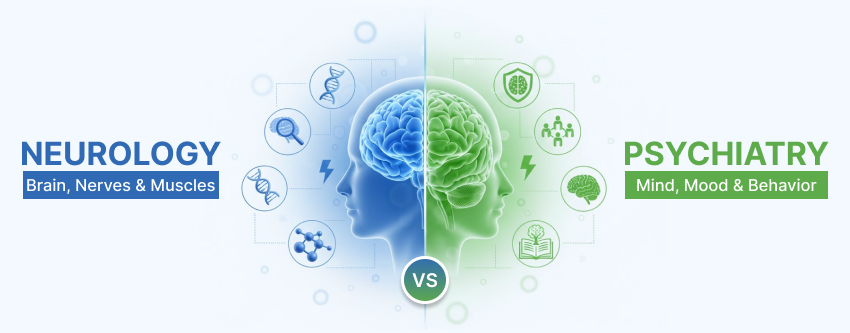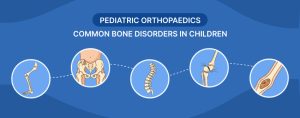The human brain is the centre of both physical and mental wellbeing, yet it can be difficult to decide which doctor to approach when symptoms appear. Should you see a neurologist or a psychiatrist? Understanding the distinction between a neurologist vs psychiatrist is key to receiving the right care at the right time. A neurologist addresses disorders of the nervous system, such as epilepsy, stroke, or migraines, while a psychiatrist focuses on mental health concerns, including anxiety, depression, and behavioural conditions. Knowing the scope of each specialist not only helps in choosing the appropriate consultation but also ensures timely diagnosis and effective treatment. This discussion offers a clear comparison of their roles, helping individuals navigate their healthcare decisions with confidence
Neurologist vs Psychiatrist: Key Differences
Here’s a simple comparison between a Neurologist and a Psychiatrist to help you understand the difference.
| Aspect | Neurologist | Psychiatrist |
| Focus | Physical disorders of the brain, spine, nerves, and muscles with a physiological basis | Mental health, emotions, behaviour, and thinking |
| Conditions | Stroke, epilepsy, Parkinson’s, migraine, multiple sclerosis, dementia | Depression, anxiety, bipolar disorder, schizophrenia, and other psychiatric disorders |
| Tools | MRI, CT scans, EEG, EMG, and neurological exams | Clinical interviews, psychological tests, medication management, talk therapy, and other psychiatric therapies |
| Treatment | Medication, physical rehabilitation, and referrals for surgery (performed by neurosurgeons if needed) | Medication, talk therapy, counselling, and other psychiatric therapies typically do not provide physical rehabilitation or surgery |
What Do Neurologists Do?
Neurology is the branch of medicine that deals with diseases of the nervous system. Neurologists are trained to identify complex physical symptoms and use advanced tests for diagnosis.
Conditions treated by neurologists include:
- Stroke
- Multiple sclerosis
- Parkinson’s disease
- Epilepsy
- Migraine
Diagnostic methods used include:
- MRI and CT scans
- EEGs (brain activity tests)
- EMGs (nerve and muscle tests)
- Neurological physical examinations
At Venkateshwar Hospital, neurological care is supported by advanced diagnostic facilities such as 3 Tesla MRI, CT, EEG, and EMG, combined with a multidisciplinary team of experienced neurologists and neurosurgeons. We focus on both accurate diagnosis and comprehensive treatment plans, ensuring specialised care for conditions ranging from common migraines to complex neurological disorders.
Also Read – Migraine vs Stroke Symptoms: Common Neurological Symptoms Explained
What Do Psychiatrists Do?
Psychiatry is a medical speciality that deals with mental, emotional, and behavioural disorders. Psychiatrists consider both the physical and psychological aspects of illness.
Conditions treated by psychiatrists include:
- Depression and anxiety disorders
- Bipolar disorder
- Schizophrenia and PTSD
- Eating disorders and addiction
Treatment approaches include:
- Talk therapy
- Cognitive Behavioural Therapy (CBT)
- Medication management and monitoring
When Should You See a Neurologist?
You may be referred to a neurologist if you experience physical symptoms such as:
- Persistent headaches or migraines
- Seizures or fainting episodes
- Dizziness or loss of balance
- Memory loss or confusion
- Muscle weakness or tremors
Often, a general physician will suggest a neurology consultation if they suspect a disorder of the brain or nervous system.
When Should You See a Psychiatrist?
Psychiatrists are usually consulted for mental health concerns such as:
- Persistent low mood or loss of interest in daily life
- Severe anxiety or panic attacks
- Disturbed sleep patterns
- Difficulty concentrating or coping with stress
- Suicidal thoughts or self-harm tendencies
Psychiatrists can also support patients with trauma recovery and ongoing therapy needs.
Overlapping Conditions That Require Both Specialists
Some conditions affect both the nervous system and mental health. In such cases, patients may need to see both specialists. Examples include:
- Traumatic Brain Injury (TBI): A Neurologist manages brain injury, psychiatrist supports emotional recovery.
- Dementia: A neurologist diagnoses and tracks progression, while a psychiatrist addresses behavioural changes.
- Epilepsy with depression or anxiety: Neurologist controls seizures, psychiatrist treats mood disorders.
Collaboration between the two fields ensures holistic care.
Still Confused? Start with Your Primary Care Doctor
If you’re uncertain whether your symptoms are neurological or psychiatric, begin with your general physician. They can evaluate your symptoms, run preliminary tests, and guide you to the right specialist. This helps resolve the neurologist vs psychiatrist question more clearly.
Conclusion
Both neurologists and psychiatrists are medical doctors, but their roles are distinct. Neurologists treat physical conditions of the brain and nerves, while psychiatrists treat mental and emotional health disorders. In some cases, you may need both. Early consultation often leads to better outcomes, as timely diagnosis and treatment can help manage conditions more effectively. Together, these two specialities usually work in collaboration to ensure patients receive an accurate diagnosis and the proper treatment for their needs.
Frequently Asked Questions
1. Are neurologists trained in mental health?
Neurologists are trained to treat conditions related to the brain and nervous system, but they are not specialists in mental health. They may recognise when symptoms overlap and will often refer patients to psychiatrists or psychologists if emotional or behavioural care is needed.
2. Do psychiatrists treat brain disorders?
Psychiatrists focus on conditions that affect mood, behaviour, and mental well-being. While they don’t treat physical brain disorders like strokes or epilepsy, they do manage disorders such as depression, anxiety, bipolar disorder, and schizophrenia, which also involve the brain.
3. What doctor should I see for memory loss?
If memory loss is sudden or linked with confusion, balance issues, or headaches, a neurologist should be your first choice. If the memory problem is related to depression, stress, or other emotional factors, a psychiatrist may be more suitable. Sometimes, both specialists work together.
4. Can neurologists prescribe antidepressants?
Yes, neurologists can prescribe antidepressants, especially if depression is linked to neurological disorders such as Parkinson’s disease or migraines. However, for ongoing or complex mood-related conditions, psychiatrists are the specialists who manage these medicines more closely.
5. Is anxiety a neurological or psychiatric condition?
Anxiety is generally considered a psychiatric condition because it affects thoughts and emotions. However, in some cases, neurological disorders may trigger or worsen anxiety, so a combined approach with both specialists can be beneficial.
6. How do I know if my symptoms are neurological or psychiatric?
Neurological symptoms often appear physically, such as tremors, seizures, or vision problems, while psychiatric symptoms usually involve changes in mood, behaviour, or thought patterns. Since both areas can overlap, it is best to consult a doctor who can guide you to the right specialist.
Medically Reviewed by — Dr. Harsh Bhardwaj (Associate Director – Neurology)

















